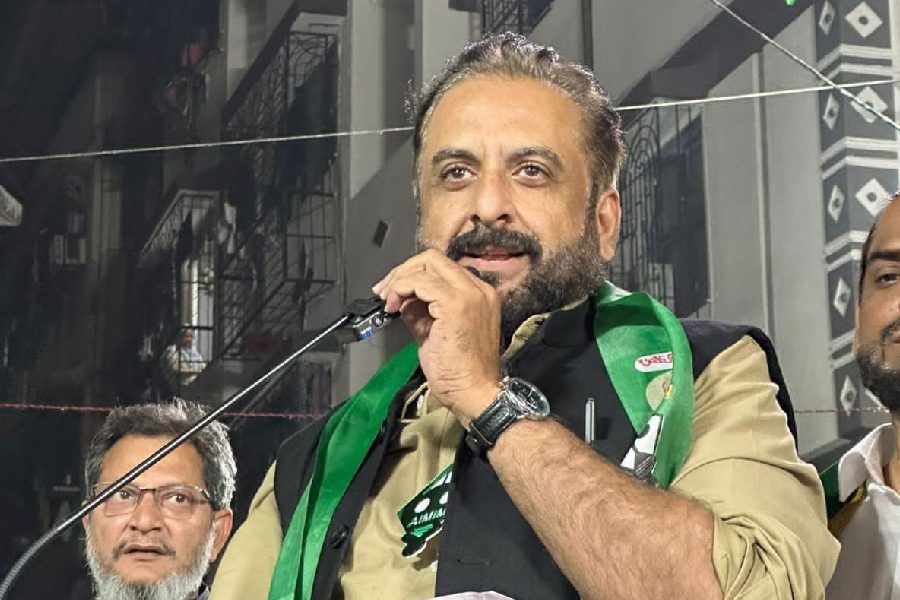 |
| Nirupam Sen |
Calcutta, July 12: Industries minister Nirupam Sen today said development schemes had not been implemented “properly” in Bengal, a disclosure notable not for its content but because of an unsettled debate in the CPM on the key factor behind the debacle in the last Lok Sabha elections.
“The district planning as we had envisaged more than two decades ago has not been implemented properly,” said Sen, who is also the minister for development and planning.
The minister was speaking during the release of three separate volumes of human development reports, prepared with technical help from the United Nations Development Programme (UNDP), for North and South 24-Parganas and North Dinajpur.
What Sen said is not particularly enlightening — few will contest the veracity of the conclusion that the Left Front has failed to deliver development in vast areas of Bengal.
But coming from Sen, who is not just a CPM minister but also a politburo member considered close to party general secretary Prakash Karat, the statement assumes an edge.
The CPM leadership in Delhi, led by Karat, has been insisting that the election defeat had more to do with voter discontent stemming from the performance of the government and the failure to deliver development despite being in power for three decades.
However, chief minister Buddhadeb Bhattacharjee and state CPM secretary Biman Bose have been pointing fingers at the central decision to snap ties with the Congress, which united the Bengal Opposition and added to a general tilt among voters towards the government led by Manmohan Singh. The conflict is a hot-button topic in the CPM, which is heading to an extended central committee meeting in Vijayawada in August. The supporters of the Bengal line want a healthy and working relationship with the Congress to keep the Opposition divided in Bengal. But the Delhi line favours intensifying the anti-Congress stand.
The issue once in a while boils forth — the last time was when chief minister Bhattacharjee left the July 4 politburo meeting in Delhi earlier than scheduled, apparently after sparks flew when the subject cropped up.
Sen’s comments on Monday are certain to be seen against this backdrop and could be read as a pointer to the way battle lines are crystallising within the party.
Today, in another blow to the beleaguered Bengal government, Sen said: “Even constitutional provisions have not been implemented properly.”
He did not specify what he meant by constitutional provisions, but Bengal’s performance in providing basic education and healthcare facilities has not been among the best.
For over two decades, the Left Front government has been crowing about its achievements in delivering development in rural Bengal. High growth rates in the state domestic product — averaging between 7 per cent and 8 per cent in the last decade — were flaunted as an indicator of the government’s success.
But a slew of electoral defeats — starting from the panchayat elections in 2008, followed by the drubbing in the Lok Sabha polls and a rout in the recently held municipal polls — drilled holes into these claims as Opposition parties made inroads into Left citadels in rural Bengal.
“The electoral defeat has led to a change and Left leaders are now admitting that they could not fulfil their promises,” said an economist who did not wish to be named.
The human development reports of the three districts released today showed that the BPL population was around 35 per cent in South 24-Parganas while 47.6 per cent of the rural population in North Dinajpur lived below the poverty line. Data for North 24-Parganas showed that over 33 per cent households did not get two square meals a day.
“If the data show human development has not been good, it becomes difficult for the minister to claim otherwise,” said economist Abhirup Sarkar.
Although Sen admitted flaws in delivering development, he left an escape route by claiming that a lag in data collection meant the reports did not reflect the entire picture.
Unlike some of his cabinet colleagues, Sen blamed the departments for the delay in collating data.
“One weakness is the lack of availability of current data. Many departments have not taken into account recent developments,” said Sen.










